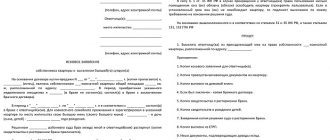8
The obligation to register at the place of residence is assigned to every citizen of the Russian Federation. That is why, even if people rent an apartment, they try to register temporarily, because otherwise they may face administrative liability under Art. 19.15 Code of Administrative Offenses of the Russian Federation.
However, punishment can be applied not only to temporarily residing citizens, but also to the owners or responsible tenants of the apartment if they do not register their tenants. Is it possible to evict people who are temporarily registered, but for some reason have become objectionable to the landlord? Let's figure it out.
Is it possible to discharge a person during temporary registration without consent?
If a person temporarily registered in an apartment, for one reason or another, does not want to voluntarily check out of it despite the request of the owner, then there are only two ways to remove the tenant from registration ahead of schedule:
- wait until the registration period expires;
- discharge the tenant by court decision.
You should not try to evict resisting tenants by force - your actions may constitute a crime under Art. 330 of the Criminal Code of the Russian Federation, although you were simply trying to defend your rights.
Example. The owner of the apartment is Sokolov K.V. under a rental agreement, he rented out an apartment owned by him to the Kalitin spouses for one year and issued them temporary registration. Three months later, the couple had a child and stopped paying rent due to financial difficulties. The spouses refused Sokolov’s request to move out, citing the fact that they were both registered in another city, and they could not be evicted to the street since they had a child.
Then Sokolov invited his friend S.T. Prokhin. and they, using physical force, kicked the family out of the apartment, and also threw their things into the street. The Kalitins turned to the police and Sokolov and Prokhin were prosecuted for arbitrariness (Article 330 of the Criminal Code of the Russian Federation).
This outcome could have been avoided if Sokolov had filed a lawsuit for eviction in court.
You can find out more about how to evict temporarily registered citizens who are not apartment owners by following this link.
Definition of concepts
To understand the essence of the problem, it is necessary to define several terms:
| Temporary registration |
|
| Living space | A house, apartment, room or other isolated place that belongs to real estate and is suitable for people to live in in accordance with the established requirements of the law. |
| Owner | A person or organization that, based on a legal fact, has the right to use and dispose of a specific thing. In this case we are talking about an apartment. |
| Fictitious registration | Registration with the Federal Migration Service without the intention of providing a person with a place to live. In this case, the citizen lives in one place, although he is temporarily registered in another residential building. |
| FMS | The Federal Migration Service. A government body that is responsible for recording and monitoring the places of residence of citizens. |
Grounds for discharge without consent
| No. | Grounds for deregistration |
| 1 | Failure to pay contractual payments |
| 2 | They use the apartment not for living, but for other purposes (they opened a store) |
| 3 | Dissolved family relations with the owner (divorce, challenging paternity, etc.) |
| 4 | Absent for a long time from the disputed housing |
| 5 | Violate other terms of the contract for the use of housing (if they do not contradict the legislation of the Russian Federation) |
| 6 | Lead an immoral and antisocial lifestyle |
Each of these grounds must be supported by evidence. This responsibility rests with the person who wishes to remove tenants from registration.
Price
Forced eviction of tenants involves going to court. The cost of the state duty is calculated based on Article 333.19 of the Tax Code of the Russian Federation. Filing a claim for eviction without the tenant's consent will cost 300 rubles .
The state duty can be paid at the cash desk of any Russian bank (for example, Sberbank). This can also be done at the cash desk of the judicial institution (if available).
Thus, the discharge of temporarily registered persons without their consent occurs through the court. The reason is considered to be inappropriate behavior of the residents. Deregistration is initiated by the owners or tenants of the premises. Cases are heard in the district court based on applications from citizens. The deadline for removing a tenant from the apartment is 3 days from the date of receipt of the court decision.
Procedure and procedure for discharge of a temporarily registered person
In order to register a temporarily registered person in an apartment, it is necessary to follow a certain sequence of actions, which may vary depending on the circumstances. Let's take a closer look at them.
Voluntarily
This is the most hassle-free method and it is necessary to start checking out unwanted residents with it. Even if you fail to reach an agreement pre-trial, when you go to court, you will have evidence that you tried to resolve the issue peacefully, and this will definitely make a good impression on the judge.
Expert opinion
Noskov Georgy
Lawyer. Experience 12 years. Specialization: civil, family, inheritance law.
So, first of all, draw up a request for deregistration and send it to the residents.
This can be done in several ways:
- in person or through a representative, but be sure to require the tenants to sign and date your copy of the request;
- by registered mail with simple notification;
- courier delivery service.
If the tenants have not checked out within the time period specified in the request, then it is worth going to court.
You can read more about how to correctly write a requirement in this article.
Upon expiration of the registration period
Another fairly simple way is to wait until the end of the agreement on granting the right to use the apartment or the temporary registration period. After this, the owner does not unilaterally renew the contract and, regardless of the tenant’s wishes, contacts the Department of Internal Affairs of the Ministry of Internal Affairs of the Russian Federation (formerly the Federal Migration Service of Russia), draws up an application for eviction and provides documents confirming the expiration of the contract and confirming the right of ownership of the housing.
At this point, the procedure for deregistering a temporarily registered person can be considered completed.
Of course, this option is only suitable if there is little time left before the registration deadline or you simply do not want to go to court.
By the tribunal's decision
To do this, you need to draw up a statement of claim, collect the necessary documents and send it all to the district court of general jurisdiction. Next, the judge considers the application and decides whether to accept the claim or leave it without consideration.
If the claim is accepted, a court hearing is scheduled, and all parties are notified of the date and time. After the hearing, the judge makes a decision. If it is not decided in your favor, then you can appeal it to a higher court.
When you have a court decision in your hands, then with it, the title documents for the apartment and your passport, you need to contact the territorial department of the Department of Internal Affairs of the Ministry of Internal Affairs of Russia and they will make changes to the records of persons registered in your housing.
Discharge procedure
You can discharge a tenant with temporary registration early as follows:
- Collect evidence.
- Prepare documents for the court.
- File a claim.
- Submit an application to the court.
- Pay the state fee.
- Wait for the meeting.
- Get a court decision.
- Wait for the decision to take effect.
- With a valid decision, contact the MFC (My Documents) or the passport office in order to discharge a temporarily registered person.
- Receive documents confirming the fact of discharge.
Statement of claim for the discharge of a person with temporary registration without his consent
Since only the Migration Service of the Ministry of Internal Affairs of Russia can deregister from an apartment (make changes to the records of registered persons), the court must only be asked to recognize the defendant as having lost ownership of the apartment or to terminate the contract (for example, a lease) early.
A statement of claim for the discharge of a tenant without his consent is drawn up in accordance with the norms enshrined in the Code of Civil Procedure of the Russian Federation.
The claim must indicate the following:
- full name of the judicial authority to which the application is sent;
- personal and contact information of the plaintiff;
- the most accurate and detailed information about the defendant;
- the correct name of the application, reflecting the essence of the claims;
- a description of the circumstances under which the defendant was registered in the apartment or house;
- indication of ownership of the living space;
- the essence of the conflict;
- motivated claims;
- list of documents attached to the application;
- petitions to subpoena witnesses for hearing;
- date of compilation, personal signature of the plaintiff.
All documents are sent to the office of the district court of general jurisdiction; after receiving the application, the judge examines it within five days and decides whether to accept it for proceedings or leave it without consideration.
The application to the court is submitted in the number of copies corresponding to the number of participants in the process. Usually this is three copies, but if there are several defendants, you will have to make copies for each of them.
Duration of the procedure
A peaceful resolution of the issue of deregistration through the passport department will take 3 business days from the date of submission of the application. The request can also be submitted through the State Services service or the MFC.
Interesting article: How to get a loan with temporary registration?
The trial period is allotted 2 months from the date of acceptance of the application (Article 154 of the Code of Civil Procedure of the Russian Federation). In difficult cases, the consideration is extended by decision of the chairman of the court for 1 month. Next, you need to wait for the court decision to come into force.
The time period is:
- 30 days if the defendant was present at the trial and did not appeal;
- 7 days if the defendant was absent from the hearing, received a copy of the decision and did not file a complaint;
- 40 days, if the temporary tenant was not at the hearing of the case, he was not given a copy of the decision and there is no response complaint.
Documentation
Since all the claims stated in the claim must be reasonably proven, the following documents must be attached to the application:
- applicant's passport;
- confirmation of ownership of the property from which it is necessary to evict the registered person ahead of schedule;
- apartment card (extract from the house register);
- evidence of violations of the terms of the contract (protocols and decisions on bringing to administrative responsibility, payment documents confirming non-payment of utilities, etc.).
Initially, documents are provided in copies, but it is better to take the originals with you to the court hearing, so that in case of doubt, the judge can verify the authenticity.
Procedure
Whatever the basis for discharging a temporarily registered person ahead of schedule without his consent, you will still have to go to court. It will not be possible to solve the problem with a simple statement of departure from the place of residence sent to the MFC, passport office, Ministry of Internal Affairs, and so on. A court decision is always required. Without it, all that remains is to wait for the expiration of the temporary registration.
If the validity period is not specified, then the registration is considered to remain valid for 5 years from the date of registration.
Legal assistance
Forced eviction of temporary residents from an apartment is a labor-intensive process. The absence of an agreement between the parties obliges the owner to prove the validity of the eviction. What if there is almost no evidence? In addition, the situation may be complicated by deteriorating relationships with tenants.
Contact us for a free consultation through a convenient form on the website or by phone. Our lawyers will help you decide on actions to get rid of temporary tenants. The main difficulties may arise when:
- filing a claim for forced eviction;
- collecting evidence that the owner is right;
- drawing up an application to initiate enforcement proceedings or a complaint against the actions/inactions of bailiffs;
- and also when negotiating with violators.
Our specialists are well versed in housing law.
Lawyers will give up-to-date advice, resolve a controversial situation, and estimate the chances of success. Remember that independent eviction is fraught with aggravation of the situation - errors in the statement of claim, weak arguments, loss of finances, and the risk of beatings. It's better to trust the professionals! Attention!
- Due to frequent changes in legislation, information sometimes becomes outdated faster than we can update it on the website.
- All cases are very individual and depend on many factors. Basic information does not guarantee a solution to your specific problems.
That's why FREE expert consultants work for you around the clock!
- via the form (below), or via online chat
- Call the hotline:
- Moscow and the Region
- St. Petersburg and region
- FREE for a lawyer!
By submitting data you agree to the Consent to PD Processing, PD Processing Policy and User Agreement.
Anonymously
Information about you will not be disclosed
Fast
Fill out the form and a lawyer will contact you within 5 minutes
Tell your friends
Rate ( 5 ratings, average: 4.20 out of 5)
Author of the article
Maxim Privalov
Lawyer. 2 years of experience. I specialize in civil disputes in the field of housing and family law.
Author's rating
Articles written
610









